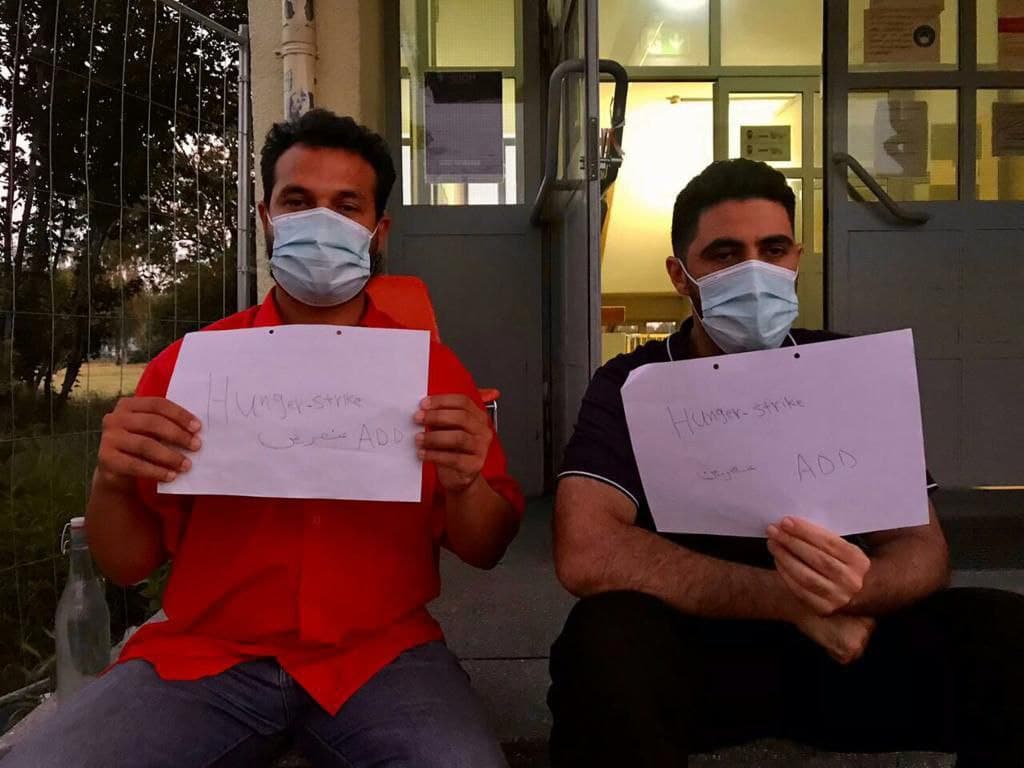We have received a report from residents of a camp near Speyer, Rhineland-Palatinate, which we would like to share here. The residents report about the ignorance with which the needs of refugees with handicap are not taken into account. They have therefore written an open letter to the responsible authorities. They also report on other problems, lack of transparency and disrespectful treatment. The report is in line with what we hear again and again from other refugee camps.

The ADD is the “Aufsichts- und Dienstleistungsdirektion” of the state of Rhineland-Palatinate, which is responsible for the accommodation and the transfer of refugees.
„This morning I went with my roommate, his name is M*, to ADD (ADD is the responsible for management and transfer department in the camp). M* and me decided to make a Hunger-strike. Here is the story of what happened:
My roommate has special needs, he has a sickness and he will be blind, he already can see only 20% and he has a hope that he can find a treatment in Germany, this is why he decided to apply for asylum in Germany.
A few months ago, he has been transferred out of the camp to a village at the border, and the ADD never considered he has special needs. M* found himself alone in the village, so his abilities to survive by himself all alone was very little.
M* have decided to come back to the camp again, where he can find some help for Cookinseln food, and familiar people and environment.
So, he came back to the camp, and he knew that he needs someone that he trusts from the camp, to go with him on transfer, which would fix the problem. M* prepared a list of 3 or 4 names. Some people that he know from the camp he trusts. Then, he asked ADD if that was possible to accept, one of the 3 or 4 names to go with him on transfer and they said it is possible.
A few weeks later, M* has got a date for transfer, on the 15th of June, but he didn’t recognize anyone from the name he recommended to go with him.
So, he and me went again to the ADD asking, why they didn’t choose anyone from names to go with him on transfer. Then one of the ADD’s employees met us and he said „we can not give you one of the names that you
recommended”.
The Employees of the ADD are the most racists humans that you can ever meet in Germany, beside the employees of the foreigners office. The ADD’s employee is very famous in the camp being rude and racist, i don’t remember his name.
He stressed many many times in the conversations, that WE ARE GERMANS and YOU ARE EGYPTIAN, people have to be in the camp up to 18 months, and it seems like we are in a jail. I asked him very politely, can you be clear with us and stop giving us the painkiller saying ” we don’t have information about the decision of transfer, on what it is based?????” This what i asked; make it clear about the procedures of the transfer, then we will stop complain and bother you asking questions regarding transfer.
He said: Non of the list you gave us has a positive decision, so they can not be transferred. And he stressed in case of rejection of the asylum application, especially Egyptians have to be in the camp up to 18
months, although it´s a big lie, because 1000 of Egyptian and none Egyptian people got transferred from the camp and the have negative decision regarding the asylum application.
Some facts:
Every wednesday, the ADD is open from 10 am til 11:30 am, for questions regarding transfer. This is a strategy what i call “PAINKILLER”, they have prepared answers
1- we don’t know
2- the law is saying you can not complain, because you are her up to 18 months
3- if you have a positive decision, then its possible to go on transfer.
Me and M* are going to continue our Hunger-Strike until we find a clear answer regarding my question
“The decision of transfer on the camp is based on what?????”
If you can help us to get our voice to the German media, this will be so much appreciated.“
S* & M*
